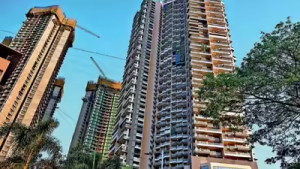Owning a flat in Maharashtra, especially in cities like Mumbai and Pune, comes with its fair share of responsibilities, and one of the most misunderstood among them is non-occupancy charges. Whether you’re an investor, absentee owner, or someone simply leasing out your property, understanding these charges is crucial in 2025.
This blog unpacks everything you need to know: What are non-occupancy charges? When do they apply? Who pays them? What’s legal, and what isn’t?
-
What Are Non-Occupancy Charges?
Non-occupancy charges are additional fees levied by a co-operative housing society when a flat is not self-occupied by its owner. This usually means the unit is either:
- Rented out to a tenant
- Kept vacant for a prolonged period
- Occupied by someone other than the owner (e.g., company employee)
These charges are over and above the regular maintenance fees and are intended to compensate for the perceived loss of community participation and additional wear and tear from tenants.
Also Read:- How to Check and Pay Property Tax in Hyderabad in 2025
-
Why Do Housing Societies Levy These Charges?
When a flat is rented or left vacant, the owner doesn’t participate in daily operations or society activities. The logic behind the fee includes:
- Non-resident owners don’t contribute to community work or meetings.
- Tenants are considered to have a higher impact on amenities.
- Societies rely on these charges to maintain financial balance.
-
Legal Framework in Maharashtra (2025)

As per the bye-laws approved under the Maharashtra Co-operative Societies Act:
- Societies cannot charge more than 10% of the service charges as non-occupancy charges.
- The charges are applicable only to service components, not to statutory charges like property tax, water bills, insurance, or common electricity.
Also Read:- E aasthi BBMP: Property Search | Apply Online | Status Check
-
Who Pays These Charges?
Only the flat owner is legally liable to pay. Even if the flat is rented, the tenant has no obligation to pay non-occupancy charges to the society.
-
When Are These Charges Applicable?
Non-occupancy charges are applied when:
- The flat is rented out to a tenant.
- The flat is vacant and unoccupied for a long time.
- Someone other than the immediate family (spouse, parents, children) occupies the flat.
They do not apply if the flat is occupied by direct family members.
-
Are Non-Occupancy Charges Mandatory?
Yes. If the society’s adopted by-laws specify them, these charges are mandatory, provided they remain within the 10% cap. Societies cannot decide to charge arbitrarily high amounts.
Also Read:- Municipal Tax on Commercial Property: Pay Online | Rules
-
Overcharging and Disputes
If a society demands more than the legal limit:
- The owner can file a complaint with the Deputy Registrar.
- Several past rulings have penalized societies for overcharging.
- Refunds can be ordered for excess amounts collected.
-
How Are Non-Occupancy Charges Calculated?

Formula:
Non-Occupancy Charges = 10% of service charges
Example:
- Total monthly maintenance: ₹5,000
- Statutory charges (water, tax): ₹2,000
- Service charges = ₹3,000
- Non-occupancy charge = ₹300 (10% of ₹3,000)
-
How Can You Avoid Paying These Charges?
Some strategies include:
- Letting close family members live in the flat.
- Providing proof of temporary self-use (e.g., utility bills).
- Declaring the occupant as a “caretaker” in certain cases.
Note: These methods must be genuine and approved by society.
-
What Documents Prove Owner Occupancy?

- Latest electricity or water bills
- Aadhar card with the flat address
- Society membership register
- Self-declaration with proof of residence
-
What Happens if You Don’t Pay?
Consequences include:
- Late fees or penalty interest
- Legal notices from the society
- Disqualification from voting or contesting elections
- Delays in getting No Dues Certificates
Also Read:- Brigade Group Strengthens Its Foothold in Chennai with ₹441 Crore Land Acquisition for Premium Housing Project
-
Co-Operative Housing Society vs Private Societies

- Co-operative societies are governed strictly by the Maharashtra Co-operative Societies Act.
- Private housing projects (not registered as co-ops) may have their own framework but often follow similar principles for transparency.
-
Annual Declaration: Why It Matters
Many societies require owners to submit a yearly declaration stating the occupancy status of their flat. This is typically accompanied by:
- Utility bills
- Tenant agreement (if rented)
- Self-attested affidavit
-
Practical Reality in Mumbai
In Mumbai, where many flats are bought purely for investment:
- Non-occupancy charges are common.
- Some societies still try to overcharge.
- It’s crucial for owners to know their rights and legal protections.
-
Summary Table: Rules at a Glance
| Aspect |
Rule |
| Applicability |
Non-resident or tenant-occupied flats |
| Maximum Charge |
10% of service charges |
| Exemptions |
Family-occupied flats |
| Payer |
Flat owner only |
| Documents Needed |
Utility bills, ID proof |
| Legal Cap |
Enforced by state bye-laws |
| Dispute Resolution |
Deputy Registrar of Co-operative Housing Societies |
Conclusion
Understanding non-occupancy charges is not just about legal compliance—it’s about fairness, community harmony, and smart ownership.
In 2025, more and more people are buying flats for rental income or as secondary homes. If you fall in this category, being aware of your obligations can save you from unnecessary penalties and disputes.
At Housiey, we believe in making property ownership easier and more transparent for every Indian homeowner. From simplifying legalese to helping you deal with society committees, we’ve got you covered.
FAQs
Owning a flat in Maharashtra, especially in cities like Mumbai and Pune, comes with its fair share of responsibilities, and one of the most misunderstood among them is non-occupancy charges. Whether you’re an investor, absentee owner, or someone simply leasing out your property, understanding these charges is crucial in 2025.
This blog unpacks everything you need to know: What are non-occupancy charges? When do they apply? Who pays them? What’s legal, and what isn’t?
-
What Are Non-Occupancy Charges?
Non-occupancy charges are additional fees levied by a co-operative housing society when a flat is not self-occupied by its owner. This usually means the unit is either:
- Rented out to a tenant
- Kept vacant for a prolonged period
- Occupied by someone other than the owner (e.g., company employee)
These charges are over and above the regular maintenance fees and are intended to compensate for the perceived loss of community participation and additional wear and tear from tenants.
Also Read:- How to Check and Pay Property Tax in Hyderabad in 2025
-
Why Do Housing Societies Levy These Charges?
When a flat is rented or left vacant, the owner doesn’t participate in daily operations or society activities. The logic behind the fee includes:
- Non-resident owners don’t contribute to community work or meetings.
- Tenants are considered to have a higher impact on amenities.
- Societies rely on these charges to maintain financial balance.
-
Legal Framework in Maharashtra (2025)

As per the bye-laws approved under the Maharashtra Co-operative Societies Act:
- Societies cannot charge more than 10% of the service charges as non-occupancy charges.
- The charges are applicable only to service components, not to statutory charges like property tax, water bills, insurance, or common electricity.
Also Read:- E aasthi BBMP: Property Search | Apply Online | Status Check
-
Who Pays These Charges?
Only the flat owner is legally liable to pay. Even if the flat is rented, the tenant has no obligation to pay non-occupancy charges to the society.
-
When Are These Charges Applicable?
Non-occupancy charges are applied when:
- The flat is rented out to a tenant.
- The flat is vacant and unoccupied for a long time.
- Someone other than the immediate family (spouse, parents, children) occupies the flat.
They do not apply if the flat is occupied by direct family members.
-
Are Non-Occupancy Charges Mandatory?
Yes. If the society’s adopted by-laws specify them, these charges are mandatory, provided they remain within the 10% cap. Societies cannot decide to charge arbitrarily high amounts.
Also Read:- Municipal Tax on Commercial Property: Pay Online | Rules
-
Overcharging and Disputes
If a society demands more than the legal limit:
- The owner can file a complaint with the Deputy Registrar.
- Several past rulings have penalized societies for overcharging.
- Refunds can be ordered for excess amounts collected.
-
How Are Non-Occupancy Charges Calculated?

Formula:
Non-Occupancy Charges = 10% of service charges
Example:
- Total monthly maintenance: ₹5,000
- Statutory charges (water, tax): ₹2,000
- Service charges = ₹3,000
- Non-occupancy charge = ₹300 (10% of ₹3,000)
-
How Can You Avoid Paying These Charges?
Some strategies include:
- Letting close family members live in the flat.
- Providing proof of temporary self-use (e.g., utility bills).
- Declaring the occupant as a “caretaker” in certain cases.
Note: These methods must be genuine and approved by society.
-
What Documents Prove Owner Occupancy?

- Latest electricity or water bills
- Aadhar card with the flat address
- Society membership register
- Self-declaration with proof of residence
-
What Happens if You Don’t Pay?
Consequences include:
- Late fees or penalty interest
- Legal notices from the society
- Disqualification from voting or contesting elections
- Delays in getting No Dues Certificates
Also Read:- Brigade Group Strengthens Its Foothold in Chennai with ₹441 Crore Land Acquisition for Premium Housing Project
-
Co-Operative Housing Society vs Private Societies

- Co-operative societies are governed strictly by the Maharashtra Co-operative Societies Act.
- Private housing projects (not registered as co-ops) may have their own framework but often follow similar principles for transparency.
-
Annual Declaration: Why It Matters
Many societies require owners to submit a yearly declaration stating the occupancy status of their flat. This is typically accompanied by:
- Utility bills
- Tenant agreement (if rented)
- Self-attested affidavit
-
Practical Reality in Mumbai
In Mumbai, where many flats are bought purely for investment:
- Non-occupancy charges are common.
- Some societies still try to overcharge.
- It’s crucial for owners to know their rights and legal protections.
-
Summary Table: Rules at a Glance
| Aspect |
Rule |
| Applicability |
Non-resident or tenant-occupied flats |
| Maximum Charge |
10% of service charges |
| Exemptions |
Family-occupied flats |
| Payer |
Flat owner only |
| Documents Needed |
Utility bills, ID proof |
| Legal Cap |
Enforced by state bye-laws |
| Dispute Resolution |
Deputy Registrar of Co-operative Housing Societies |
Conclusion
Understanding non-occupancy charges is not just about legal compliance—it’s about fairness, community harmony, and smart ownership.
In 2025, more and more people are buying flats for rental income or as secondary homes. If you fall in this category, being aware of your obligations can save you from unnecessary penalties and disputes.
At Housiey, we believe in making property ownership easier and more transparent for every Indian homeowner. From simplifying legalese to helping you deal with society committees, we’ve got you covered.
FAQs










